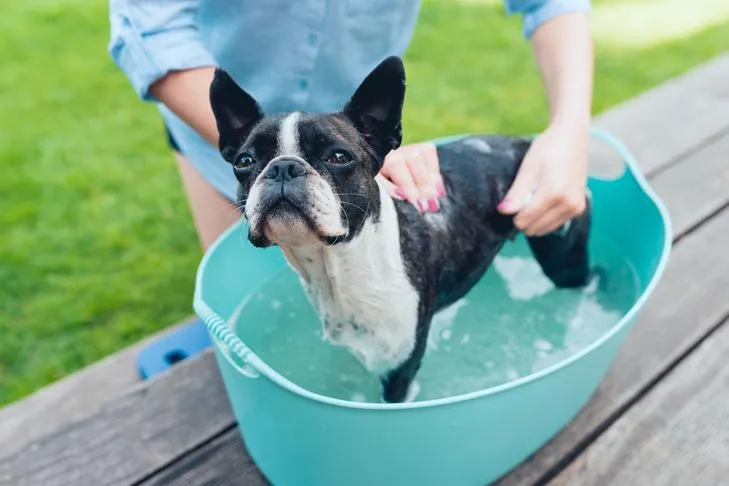If you’ve discovered that your beloved dog or even a family member has lice, a common concern that immediately springs to mind is how these bothersome parasites might spread. The good news, and often the most reassuring piece of information, is that you generally cannot get lice from your dog, nor can your dog contract lice from you. This is because lice are highly species-specific. The lice that thrive on your canine companion’s blood and skin debris are adapted specifically for dogs and are not interested in — or capable of — living on humans, and vice versa. So, if you’re asking “Can You Get Lice From Your Dog,” the answer is a resounding no, which provides a significant relief for many pet owners.
However, while interspecies transmission between dogs and humans isn’t a concern for lice, there’s still plenty to be aware of when it comes to these unwelcome guests on your pet. Similar to the more common pest, fleas, a lice infestation can cause considerable discomfort for your dog, including intense itching, pain, skin inflammation, and even hair loss. If left untreated, a severe infestation can lead to more serious health issues, making it crucial for dog owners to understand how to identify, prevent, and quickly eradicate lice if their canine friend is unfortunate enough to become infested. This guide will delve into everything you need to know about dog lice, ensuring you’re well-equipped to protect your pet. In fact, understanding that can a human get lice from a dog is not possible helps focus efforts on treating the dog’s specific problem.
What Exactly Are Dog Lice?
Lice that infest dogs are small, flat, wingless insects with six legs, meticulously designed to live within the hair or feathers of their host mammals and birds. Each of their legs is equipped with strong, hook-like claws, perfectly adapted to grip onto the hair shafts of their specific host. This specialized claw structure is precisely why lice are species-specific; their claws are sized to the particular diameter of the host’s hair shaft, preventing them from effectively attaching to different species like humans. These parasites sustain themselves by feeding on various materials, including skin debris, sebaceous secretions (oils produced by the skin), feathers, or the blood of the host animal.
There are two primary categories of lice that can affect dogs:
Chewing Lice (Mallophaga)
Chewing lice, also known as biting lice, possess a blunt, flat head and survive by consuming skin debris and surface secretions. Instead of piercing the skin for blood, they feed on dead skin cells, hair, and the oily secretions found on the dog’s coat.
Globally, two main species of chewing lice affect dogs and wild canids: Trichodectes canis and Heterodoxus spiniger. T. canis is widely distributed and typically completes its life cycle on a host within approximately 30 days. H. spiniger, while less common in some regions, is mostly found in tropical areas. Although it’s a rare sight on domestic dogs in North America, it has been observed on coyotes, red foxes, and gray wolves. Interestingly, researchers also documented this specific type of lice on dogs in southeastern Mexico in 2015, highlighting its presence in certain geographical contexts.
Sucking Lice (Anoplura)
In contrast to chewing lice, sucking lice are obligate blood feeders, meaning they require blood to survive. The primary species of sucking lice that affects dogs is called Linognathus setosus. These lice are distinctly different from chewing lice as they possess a sharp, pointed mouthpiece designed for piercing the skin to draw blood. They are widely distributed, particularly prevalent in tropical and subtropical regions across North and South America, Africa, India, and Asia. When considering if can my dog get lice from me, it’s important to remember these parasites are exclusively adapted for dogs.
 Golden Retriever dog vigorously scratching its head with a paw, indicating an itch that could be caused by dog lice.
Golden Retriever dog vigorously scratching its head with a paw, indicating an itch that could be caused by dog lice.
What Are the Signs of Dog Lice Infestation?
Adult lice are typically large enough to be detected by the naked eye, measuring about 2 to 4 millimeters, which is roughly the size of a sesame seed. These parasites usually range in color from yellow to tan or a medium brown. You can often spot the parasites themselves by carefully parting your dog’s hair and examining the hair shafts. They are distinctly different from fleas, which appear much darker, almost black.
Chewing lice tend to move more actively on the dog’s coat compared to sucking lice. Sucking lice, much like ticks, embed their piercing mouthparts into the skin to feed, making them less mobile. If you suspect your dog has a lice infestation, a thorough examination of their coat with a flea comb can help. Run the comb through the hair and then inspect the collected debris for any signs of movement or the parasites themselves.
Dog owners sometimes confuse lice, particularly the eggs (known as nits), with dandruff. A simple method to differentiate between the two is to gently remove some hair with the suspected flakes. If the small flakes easily fall off when shaken, it’s likely dandruff. However, if they stubbornly cling to the hair shaft, they are probably lice eggs. Beyond these visual cues, other common signs of lice infestations on your dog include:
- Intense and persistent scratching or itchiness: This is often one of the first and most obvious symptoms.
- A rough, dry, or matted coat: The constant scratching and the presence of parasites can severely impact coat health.
- Hair loss: Particularly noticeable around the ears, neck, shoulders, groin, and rectal areas, due to scratching and irritation.
- Small wounds or bacterial skin infections: These can result from the bites of sucking lice or from the dog’s self-inflicted scratching, providing entry points for bacteria.
- Restless or irritable behavior: Constant discomfort can make your dog agitated and unable to settle.
- Anemia: In severe cases, especially in small dogs and puppies, a heavy infestation of sucking lice can lead to anemia due to significant blood loss.
- Transmission of other parasites or bacteria: Lice can sometimes act as vectors for other health issues, such as tapeworms. Concerns about other parasites, like asking if my dog has giardia can i get it, highlight the broader vigilance needed for pet health.
 A Standard Schnauzer puppy scratching its side while sitting in green grass, a common symptom of a parasitic infestation like dog lice.
A Standard Schnauzer puppy scratching its side while sitting in green grass, a common symptom of a parasitic infestation like dog lice.
How Do Dogs Get Dog Lice?
Lice have limited mobility, which dictates their mode of transmission. They are capable of crawling but cannot jump, hop, or fly, making direct contact the primary method of spread. Furthermore, adult lice are quite dependent on their host and will typically die within a few days if they fall off. Therefore, transmission most commonly occurs through direct contact with another animal that is already infested.
However, direct contact isn’t the only way lice can spread. They can also be passed on indirectly via contaminated items. This includes shared bedding, dog collars, leashes, or grooming tools that have been used on an infested animal and not properly cleaned. Any environment where dogs congregate increases the risk of transmission. Places like dog daycare centers, boarding kennels, and dog parks are potential hotspots where lice could be picked up.
The life cycle of a louse consists of three distinct stages: egg, nymph, and adult.
The cycle begins when a female louse lays tiny, typically yellow or white eggs, which are firmly glued to the base of the dog’s hair shafts. These eggs, often called nits, are remarkably resilient and will not easily fall off, even when the dog is shampooed.
It takes approximately one week for these eggs to hatch, releasing the immature lice, known as nymphs. These nymphs are initially no larger than the head of a pin. After undergoing several molts, they grow and develop, reaching the adult phase in about another week. Once adults, they are reproductively capable, and the cycle begins anew. According to the Merck Veterinary Manual, the entire process from nit to reproductively capable adult typically takes about 3 to 4 weeks. This cycle is confined to the dog, reaffirming that can your dog get lice from you is not a worry.
 A Boston Terrier dog being bathed in a tub outdoors, illustrating a step in treating or preventing dog lice infestations.
A Boston Terrier dog being bathed in a tub outdoors, illustrating a step in treating or preventing dog lice infestations.
How Do You Get Rid Of Dog Lice?
Thanks to the widespread use of monthly flea and tick preventatives, lice infestations have become relatively rare among well-cared-for pet dogs. Today, lice are most commonly found on animals that are elderly, sick, stray, or living in unsanitary conditions, as these dogs often have compromised immune systems or lack regular grooming and preventative care.
Treating a severe lice infestation typically involves several steps. For dogs with matted hair, it’s often necessary to clip the affected fur, as lice and their eggs (nits) can be firmly attached to these mats and incredibly difficult to remove otherwise. Following this, using a fine-toothed flea comb can help physically remove live and dead lice from the rest of the coat. However, it’s crucial to remember that a flea comb alone will not kill the eggs on the dog or prevent them from hatching. After using a flea comb, always immerse it in hot water mixed with a flea shampoo or another appropriate insecticide for at least 10 minutes to kill any remaining parasites and eggs. It’s also important to clarify the common misconception: can my dog get lice from a human is not a concern, so your treatment focus remains solely on the dog.
Numerous insecticides are highly effective treatments for lice in dogs. These include topical products containing Fipronil, imidacloprid, and selamectin. Topical permethrin can also be used effectively on dogs. Dr. Jerry Klein, AKC Chief Veterinarian, advises, “Always ask your veterinarian about what products are safe to use on your dog based on his health, breed, and age.” It is also critically important to exercise caution with some of these products if you also own cats, as many common canine insecticides are highly toxic to felines.
Most insecticide treatments, whether applied topically or used in shampoos, will effectively kill nymphs and adult lice but typically do not eradicate the eggs. Therefore, it is essential to repeat any treatment at regular intervals, usually for a month or longer, as directed by your veterinarian, to ensure that newly hatched lice are eliminated before they can lay new eggs. If you live in a multi-dog household, it is imperative to treat all dogs simultaneously to prevent reinfestation among them. After treatment, keep the infested dog and their bedding separated from other animals for at least four weeks to break the life cycle and prevent spread.
To prevent reinfestation, thorough environmental cleaning is paramount. Wash all bedding, dog sweaters, leashes, and collars in hot water. Additionally, thoroughly clean and disinfect all areas where your dogs spend time, such as crates, kennels, and sleeping spots. Some veterinarians even recommend replacing grooming tools entirely because removing the sticky eggs from combs and brushes can be incredibly difficult and may lead to recurrence.
Lice generally infest dogs whose health is compromised or who live in unsanitary conditions. A proactive approach to prevention involves significantly improving your dog’s overall condition. This includes providing better nutrition, ensuring regular grooming, and maintaining a clean and appropriate housing environment. These measures will contribute greatly to boosting your dog’s immune system and making them less susceptible to future louse infestations.
References
- Merck Veterinary Manual. Lice of Dogs. Available at: https://www.merckvetmanual.com/dog-owners/skin-disorders-of-dogs/lice-of-dogs
- Micro.magnet.fsu.edu. Trichodectes canis. Available at: http://micro.magnet.fsu.edu/optics/olympusmicd/galleries/brightfield/trichodectescanis.html
- AKC. Ticks on Dogs. Available at: https://www.akc.org/expert-advice/health/ticks-on-dogs/
- AKC. Anemia in Dogs. Available at: https://www.akc.org/expert-advice/health/anemia-in-dogs/
- AKC. Tapeworms in Dogs. Available at: https://www.akc.org/learn/dog-health/tapeworms-in-dogs-symptoms-treatment-and-prevention/
- AKC. Best Flea & Tick Prevention for Dogs. Available at: https://www.akc.org/expert-advice/health/best-flea-tick-prevention-dogs/
- AKC. How to Groom a Dog. Available at: https://www.akc.org/expert-advice/health/how-to-groom-a-dog/
- AKC. How to Train in a Multi-Dog Household. Available at: https://www.akc.org/expert-advice/training/how-to-train-in-a-multi-dog-household/
- BIOONE. First Report of Chewing Lice Heterodoxus spiniger (Enderlein, 1909) and Menopon gallinae (Linnaeus, 1758) (Phthiraptera: Amblycera) from Dogs and Chickens in Southeastern Mexico. Southwestern Entomologist, 42(2), 211-214. (2015). Available at: https://bioone.org/journals/southwestern-entomologist/volume-42/issue-2/059.042.0211/First-Report-of-Chewing-Lice-Heterodoxus-spiniger-Enderlein-1909-and/10.3958/059.042.0211.full
